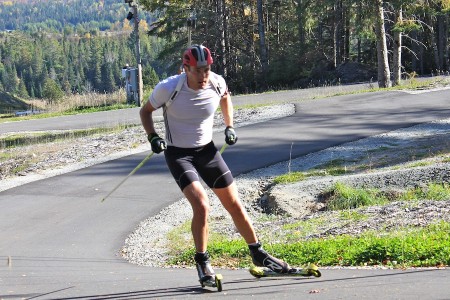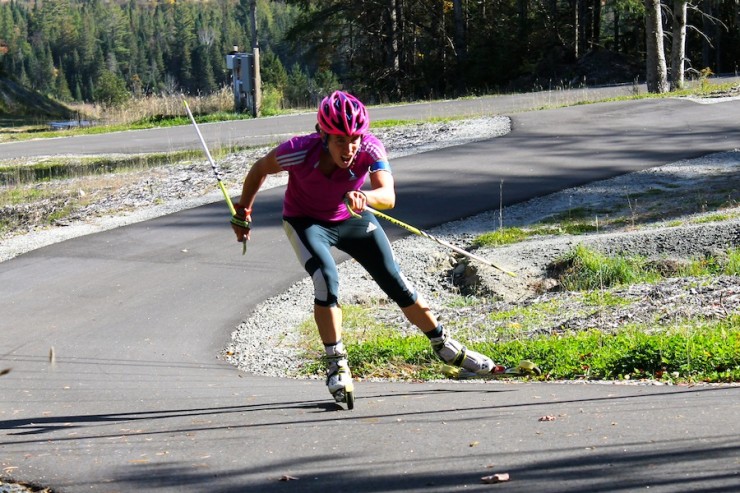
What a difference four years make.
Going into the last Olympics, Tim Burke and Susan Dunklee were in two very different phases of their careers. Burke had worn the overall World Cup leaders jersey, and was talked up as possibly the first U.S. biathlete in history to earn an Olympic medal. Dunklee, on the other hand, had only been doing the sport for two years.
But both faced the weight of expectations, and had to deal with disappointment. For Burke, it was results that didn’t match his hopes, in part because of a major weather snafu in the sprint. For Dunklee, who was trying to make the Olympic team, it was the blow of just missing it.
Going into Sochi, both are stronger for their experiences four years ago, and in between. And Dunklee has caught up a bit. The pair were the top-ranked male and female biathlete for the U.S. last season, with Burke winning a silver medal in the 20 k individual at World Championships and Dunklee placing seventh in the 15 k individual at the all-important pre-Olympic World Cups.
“Maybe I’m getting a little bit more attention this year because of my results last season, but I feel like I’m much more prepared for that this time around because I have some experience with it,” Burke told FasterSkier this fall. “So, I just do a better job now at scheduling and not always saying yes to everything and not reading everything that’s written about me.”
One major challenge is managing the media requests that come in for potential Olympic medalists. There are media summits, shoots for sponsors, and in the spring a trip to NBC studios in California.
But another, again, is the pressure.

“Four years ago I felt like I had a lot of pressure wanting to make the team, but I didn’t think it was the most realistic expectation for me because I was so new at the shooting aspect of the sport,” Dunklee said. “But I knew then four years ago, if I stuck with it for another four years, that I wanted to be in a good place this time around. Sarah Konrad gave me some of the best advice going into this round. She says ‘Well, when you go into the Sochi trials, don’t risk being on the bubble’.”
Mission accomplished. Based on results from the 2013 season, Burke, Dunklee, and Lowell Bailey are pre-qualified for Sochi. They don’t have to worry about the stress of trials races, and can train through to peak for the Olympics rather than qualification.
But mayb the best weapon in their arsenal is just that the athletes have learned a lot, both from the last Olympics and everything in between.
“I think every experience you have definitely teaches you something,” Dunklee said. “It teaches you how to deal with something – expectation. And for me, I think a lot of my expectation is internal, so learning to focus on the process and not the goal.”
Burke has had his ups and downs since Vancouver, struggling one season with compartment syndrome but then bouncing back with podiums, including the medal at World Championships. Last year he finished third in the discipline standings for both the sprint and individual. A major part of his strength comes from a new maturity to weather the storms and have the confidence to take each new day as a new possibility.
“I think one of the hardest parts is understanding that and understanding that you’re always going to have those big ups and downs in biathlon,” he said. “And learning that that it doesn’t matter if I start off the Olympics or any World Cup with a bad race, it can change literally in one race. And I saw that last year at World Championships where my first races, they were pretty bad and I was pretty disappointed. Then I had a medal performance.”
This can translate into Dunklee’s process goals: taking specific elements of the sport and worrying about them, not the podium.
“I think that’s biathlon in a nutshell honestly, because you get on the shooting mat in a high pressure situation and you think ‘Oh, I just have to make this fifth shot, and then our relay team is in the top six,’ or ‘ I just have to make this fifth shot, and I’m in the top ten,’ and you know the second you start thinking along those lines, you tense up somewhere in your body and you miss that shot,” she explained. “Instead, you have to think about ‘Ok, just focus on the trigger squeeze, just focus on the trigger squeeze.’
She and her teammates have some good role models for learning these lessons.
“[Burke and Bailey] been doing this for a long time,” she said. “They know how to weather the ups and the downs. They know how to deal with the pressures, balance the media, the training, all this other stuff and I’m still learning the ropes in a lot of ways and it’s been great to have them as role models to look up to, but I definitely feel a lot more confident and comfortable with my role now than I did a few years ago, that’s for sure.”
Plus, there are those good results from last season.
“That gives me a lot of confidence,” Burke said. “You know, I’ve been on a podium before, but to have a World Championship medal, I can prove to myself that I can compete with the best guys in the most important races and hopefully I can do that again at the Olympics.”
So if, and hopefully this won’t happen, the Olympics kick off with a disappointing sprint? He’ll be ready, more ready than he was before.
“I think I’m pretty resilient,” he said. “I’ve definitely had a lot of ups and downs you know with injuries but also just with performance, so I’ve learned a lot from that. I’ve learned to just never give up on myself and just try and treat each race like a new opportunity.
-Alex Matthews and Emily Schwing contributed reporting.
Chelsea Little
Chelsea Little is FasterSkier's Editor-At-Large. A former racer at Ford Sayre, Dartmouth College and the Craftsbury Green Racing Project, she is a PhD candidate in aquatic ecology in the @Altermatt_lab at Eawag, the Swiss Federal Institute of Aquatic Science and Technology in Zurich, Switzerland. You can follow her on twitter @ChelskiLittle.



